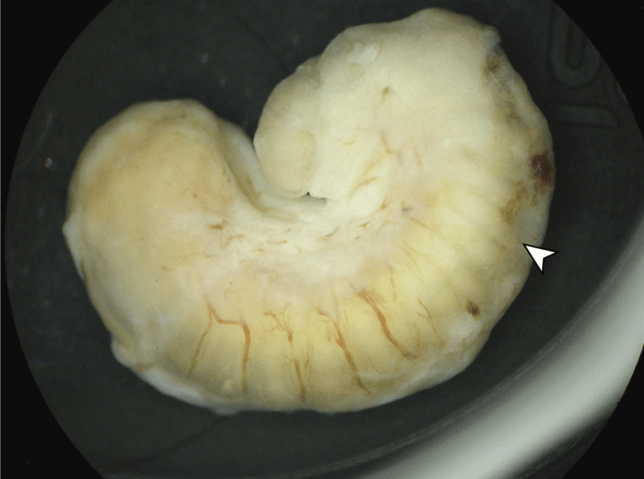If you’re at all squeamish about eyeballs or parasites, brace yourself.
A lump growing in a woman’s eye for two years turned out to be a larva, possibly caught from eating infected crocodile meat.
The parasite is known as a pentastomid, leading to the rare case of ‘ocular pentastomiasis’.
The 28-year-old, from the Democratic Republic of the Congo, had no other symptoms of infection other than the lump in her eye, which had grown to about one centimetre long.
While examining it, doctors discovered the lump could move, and so operated. Inside, they found the small, pale larva. Further analysis revealed it to belong to the species called Armillifer grandis.
Armillifer is known to infect humans in Africa and other regions of the world, usually via snakes.
The parasites typically infect mice as larvae, which are then eaten by snakes, where they grow to adulthood, and produce eggs which the snake then passes out, starting the cycle again.
Where people regularly handle or eat snakes they can disrupt the cycle, and become infected with the larvae themselves.
However, the woman in this case said she had not come into contact with any of the reptiles.
‘Our patient reported never having had contact with snakes but regularly consumed the meat of small crocodiles,’ the doctor wrote, publishing the case in the journal JAMA Ophthalmology.
‘No case of Armillifer ocular infection has ever been reported in individuals who eat crocodile meat, but crocodiles can be infected by pentastomids.
‘We therefore recognise the possibility that the infection occurred after the consumption of crocodile meat contaminated with pentastomid eggs. This meat could also have been contaminated via infected snake meat on a market stall.’
While there is no way to 100% confirm this is where the infection came from, the team says increased awareness of the possible transmission is needed.
MORE : Parents on a Japanese island deformed their children’s heads. No one knows why
MORE : Uranus has something unexpected deep inside it
MORE : Map shows where 1,000,000,000,000 randy insects will invade for first time in 200 years
Get your need-to-know
latest news, feel-good stories, analysis and more
This site is protected by reCAPTCHA and the Google Privacy Policy and Terms of Service apply.













